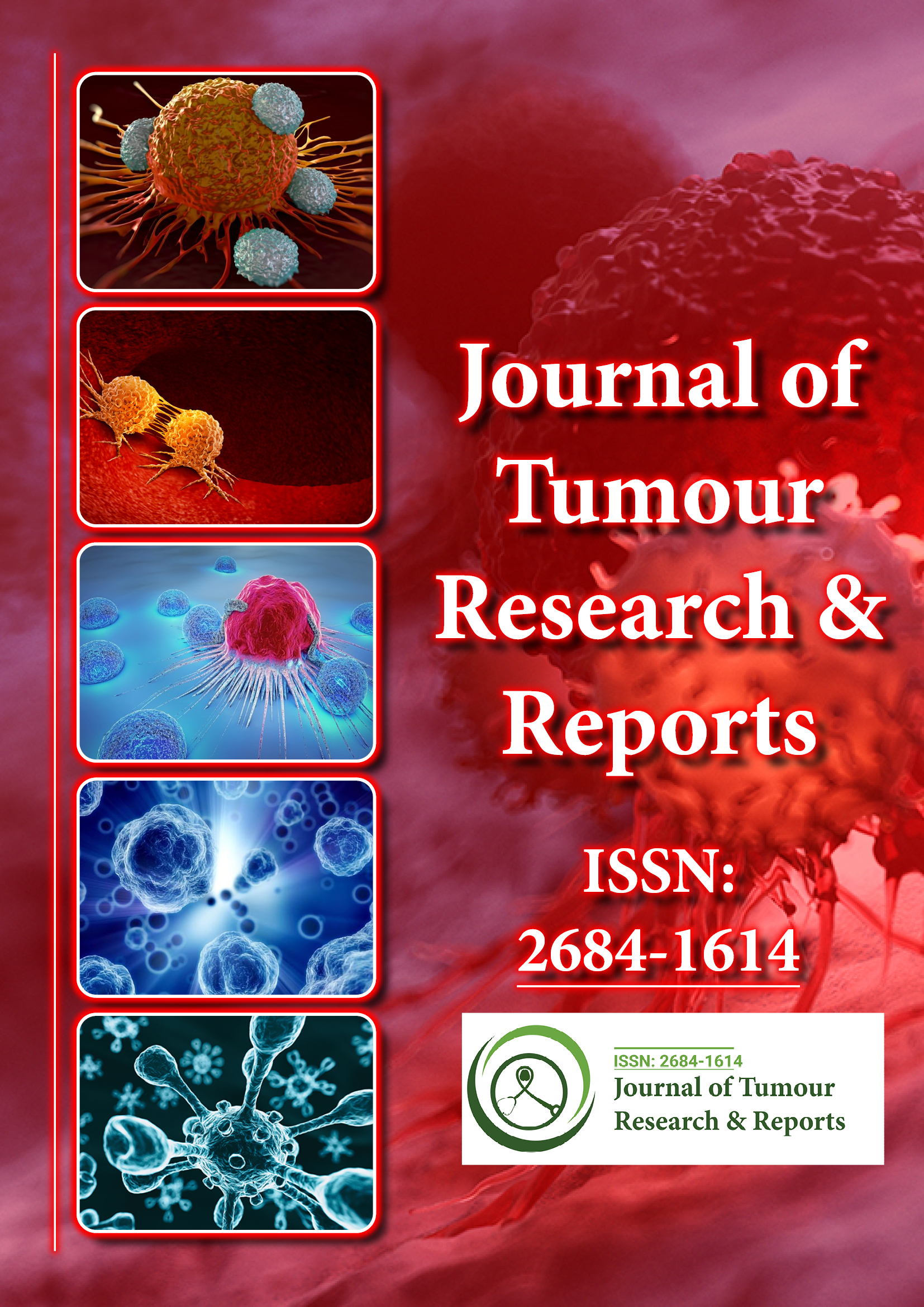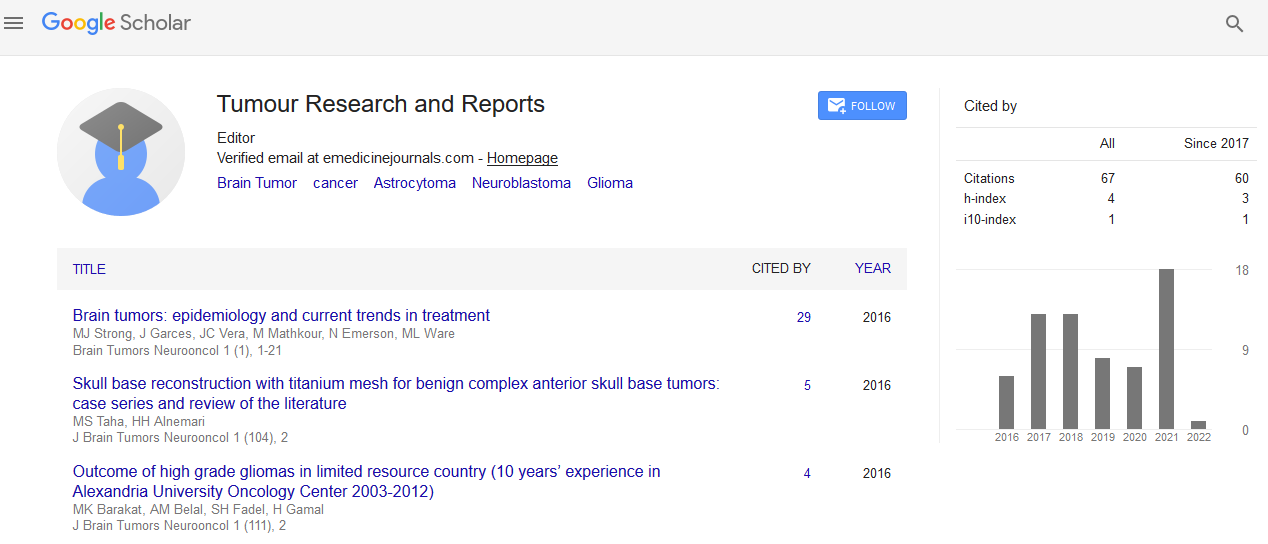Indexed In
- RefSeek
- Hamdard University
- EBSCO A-Z
- Google Scholar
Useful Links
Share This Page
Journal Flyer

Open Access Journals
- Agri and Aquaculture
- Biochemistry
- Bioinformatics & Systems Biology
- Business & Management
- Chemistry
- Clinical Sciences
- Engineering
- Food & Nutrition
- General Science
- Genetics & Molecular Biology
- Immunology & Microbiology
- Medical Sciences
- Neuroscience & Psychology
- Nursing & Health Care
- Pharmaceutical Sciences
Opinion - (2024) Volume 9, Issue 1
Stromal Tumors in Pregnancy: Impact on Maternal Health and Pregnancy Outcomes
Peter Jenkins*Received: 01-Mar-2024, Manuscript No. JTRR-24-25397; Editor assigned: 04-Mar-2024, Pre QC No. JTRR-24-25397 (PQ); Reviewed: 18-Mar-2024, QC No. JTRR-24-25397; Revised: 25-Mar-2024, Manuscript No. JTRR-24-25397 (R); Published: 01-Apr-2024, DOI: 10.35248/2684-1614.24.9:222
Description
Pregnancy brings various changes in a woman's body, both physiological and hormonal. However, the occurrence of stromal tumors during pregnancy presents unique challenges. Stromal tumors, though rare, can complicate pregnancy and necessitate careful consideration in terms of diagnosis and treatment. Understanding the effects of these tumors during pregnancy is essential for ensuring optimal maternal and fetal outcomes.
Understanding stromal tumors
Stromal tumors, also known as mesenchymal tumors, originate from the supportive connective tissue of organs. In the context of pregnancy, stromal tumors can arise in various locations, including the uterus, ovaries, and gastrointestinal tract. These tumors can range from benign to malignant and may exhibit diverse clinical behaviours.
Diagnosis during pregnancy
Diagnosing stromal tumors during pregnancy poses unique challenges due to limitations in imaging methods and the need to minimize fetal exposure to radiation. Ultrasonography remains the primary imaging modality for evaluating pelvic masses during pregnancy. However, Magnetic Resonance Imaging (MRI) may be utilized when additional information is required, as it does not involve ionizing radiation.
Treatment considerations
The management of stromal tumors during pregnancy requires a multidisciplinary approach involving obstetricians, oncologists, and surgeons. Treatment decisions must balance the need to control the tumor with the safety of the mother and fetus. In cases of benign stromal tumors causing significant symptoms or complications, conservative surgical approaches may be considered, taking into account the gestational age and fetal well-being.
For malignant stromal tumors diagnosed during pregnancy, treatment strategies may include a combination of surgery, chemotherapy, and radiation therapy. However, the timing of treatment initiation must be carefully planned to minimize fatal exposure to teratogenic agents and radiation. Additionally, close monitoring of maternal and fetal well-being is essential throughout the treatment process.
Impact on pregnancy outcomes
The presence of stromal tumors during pregnancy can impact maternal health and pregnancy outcomes. Depending on the size and location of the tumor, complications such as pain, bleeding, and obstructed labour may arise. Furthermore, certain stromal tumors, particularly those with malignant potential, can increase the risk of preterm birth and fetal growth restriction.
Follow-up and surveillance
After the successful treatment of stromal tumors during pregnancy, ongoing follow-up and surveillance are potential to monitor for tumor recurrence and ensure the long-term health of both the mother and child. Regular imaging studies and clinical assessments are necessary to detect any signs of tumor recurrence or metastasis.
Stromal tumors represent a rare but significant concern during pregnancy, requiring careful consideration in terms of diagnosis and treatment. The management of these tumors necessitates a multidisciplinary approach aimed at balancing maternal oncologic needs with fetal safety. With timely diagnosis, appropriate treatment, and close monitoring, favourable outcomes can be achieved for both the mother and baby. The research efforts are needed to further elucidate the optimal management strategies for stromal tumors in pregnant women, ultimately improving maternal and fetal health outcomes.
Citation: Jenkins P (2024) Stromal Tumors in Pregnant Women: Impact on Maternal Health and Pregnancy Outcomes. J Tum Res Reports. 9:222.
Copyright: © 2024 Jenkins P. This is an open access article distributed under the terms of the Creative Commons Attribution License, which permits unrestricted use, distribution, and reproduction in any medium, provided the original author and source are credited.

